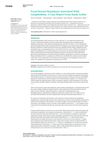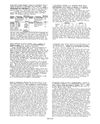 11 citations,
January 1998 in “Dermatology”
11 citations,
January 1998 in “Dermatology” Spironolactone works well for acne and hirsutism, isotretinoin is very effective for acne and may have antiandrogenic effects, and 5 alpha-reductase inhibitors should be considered antiandrogens.
 9 citations,
March 2009 in “Psychoneuroendocrinology”
9 citations,
March 2009 in “Psychoneuroendocrinology” Certain gene variations are linked to better memory in healthy Chinese women.
 8 citations,
March 2021 in “Medicina-lithuania”
8 citations,
March 2021 in “Medicina-lithuania” PRP treatment may promote hair growth and improve hair density in women with AGA, but more research is needed.
 6 citations,
January 2013 in “Genetics and Molecular Research”
6 citations,
January 2013 in “Genetics and Molecular Research” Women with hair loss have more androgen receptors in certain hair follicles.
 5 citations,
January 2016 in “Dermatology”
5 citations,
January 2016 in “Dermatology” No significant link between CAG repeat numbers and female pattern hair loss in Han Chinese population.
 January 2024 in “Hypertension research”
January 2024 in “Hypertension research” More research is needed to understand sex and racial differences in long COVID.
 April 2023 in “Acta Scientific Orthopaedics”
April 2023 in “Acta Scientific Orthopaedics” The essay suggests hair loss might be caused by changes in skull bones.

A 12-year-old girl in Saudi Arabia with Focal dermal hypoplasia showed skin and dental symptoms, highlighting the condition's variability and the need for personalized treatment.
 July 2015 in “Cambridge University Press eBooks”
July 2015 in “Cambridge University Press eBooks” Androgens like testosterone affect skin health and can lead to conditions such as acne and hair loss, with various treatments available.
 August 2012 in “Expert Review of Dermatology”
August 2012 in “Expert Review of Dermatology” Men with early hair loss may have a higher risk of enlarged prostate and possibly prostate cancer due to shared hormonal factors.
 April 1974 in “Pediatric Research”
April 1974 in “Pediatric Research” The Naked (N) trait in mice is linked to lower glycine and tyrosine in hair proteins.
 December 2020 in “Skin appendage disorders”
December 2020 in “Skin appendage disorders” Finasteride may effectively treat hair loss in Klinefelter Syndrome patients.
 185 citations,
August 2020 in “Mayo Clinic Proceedings”
185 citations,
August 2020 in “Mayo Clinic Proceedings” Men are more likely to have severe COVID-19 cases and fatalities than women due to factors like lifestyle, aging, and biological differences.
 93 citations,
June 2001 in “The Journal of Clinical Endocrinology and Metabolism”
93 citations,
June 2001 in “The Journal of Clinical Endocrinology and Metabolism” Certain genetic variations in the AR and ERβ genes can affect androgen levels in women.
 81 citations,
June 2012 in “European journal of human genetics”
81 citations,
June 2012 in “European journal of human genetics” Inherited ichthyoses cause widespread skin scaling and thickening due to gene mutations.
 40 citations,
March 2019 in “Nature Communications”
40 citations,
March 2019 in “Nature Communications” CRAC channels are crucial for the development and function of specialized immune cells, preventing severe inflammation and autoimmune diseases.
 37 citations,
June 2011 in “Journal of Cellular Biochemistry”
37 citations,
June 2011 in “Journal of Cellular Biochemistry” Androgen is important in controlling stem cell differentiation, reducing fat development, and increasing lean mass.
 37 citations,
January 2008 in “Gynecological Endocrinology”
37 citations,
January 2008 in “Gynecological Endocrinology” Shorter CAG repeats in a specific gene may increase male hormone activity and symptoms like acne and excess hair in women with PCOS.
 34 citations,
July 2020 in “Frontiers in immunology”
34 citations,
July 2020 in “Frontiers in immunology” Androgens may influence T cells, contributing to higher autoimmune liver disease risk in women.
 17 citations,
July 2017 in “Molecular and Cellular Endocrinology”
17 citations,
July 2017 in “Molecular and Cellular Endocrinology” Effective treatments for spinal and bulbar muscular atrophy are not yet available; more research is needed.
 4 citations,
December 2020 in “Mammalian genome”
4 citations,
December 2020 in “Mammalian genome” Harlequin mutant mice have hair loss due to low AIF protein levels and retroviral element activity.
 November 2016 in “Elsevier eBooks”
November 2016 in “Elsevier eBooks” Genetic mutations can affect female sexual development, requiring personalized medical care.
 989 citations,
August 2007 in “The Lancet”
989 citations,
August 2007 in “The Lancet” PCOS is a complex condition with major health impacts, needing more research for better diagnosis and treatment.
 721 citations,
October 2011 in “Nature”
721 citations,
October 2011 in “Nature” Different types of long-lasting stem cells are responsible for the growth and upkeep of the mammary gland.
 658 citations,
June 2003 in “Endocrine reviews”
658 citations,
June 2003 in “Endocrine reviews” Male hormones may play a role in the development of heart disease, and more research is needed to understand their effects.
 378 citations,
November 2011 in “Human reproduction update”
378 citations,
November 2011 in “Human reproduction update” Experts recommend using evidence-based methods to diagnose and treat hirsutism, focusing on symptoms and underlying causes.
 305 citations,
February 2007 in “Hormone and metabolic research”
305 citations,
February 2007 in “Hormone and metabolic research” Human skin makes sexual hormones that affect hair growth, skin health, and healing; too much can cause acne and hair loss, while treatments can manage these conditions.
 229 citations,
August 2002 in “Experimental Gerontology”
229 citations,
August 2002 in “Experimental Gerontology” AGA causes hair loss by shrinking hair follicles due to DHT binding, and can be treated with finasteride and minoxidil.
 203 citations,
December 2004 in “Journal of The American Academy of Dermatology”
203 citations,
December 2004 in “Journal of The American Academy of Dermatology” Early diagnosis and treatment, using finasteride, minoxidil, or hair transplantation, improves hair loss outcomes.
 195 citations,
May 2003 in “Obstetrics and gynecology (New York. 1953. Online)/Obstetrics and gynecology”
195 citations,
May 2003 in “Obstetrics and gynecology (New York. 1953. Online)/Obstetrics and gynecology” Most women with excess hair growth have an underlying hormonal issue, often treated with medication and hair removal methods.





























